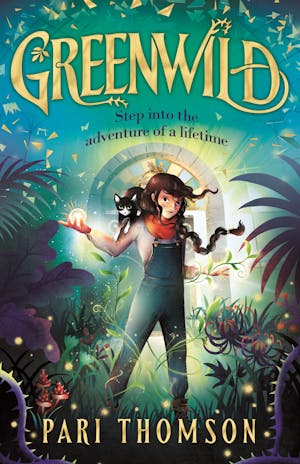Chapter 1
Six months later
Daisy Thistledown didn’t have a home in the ordinary sense of the word, but there was something about London that always made her feel particularly happy. They had arrived that morning from Rome, where Ma had been writing an article about some disreputable politicians, and they’d had to leave rather quickly after it was published. Here in London, the December sky was a dazzling blue above the rooftops, and there was a glittering, festive feeling in the air. They were in town for a meeting with Ma’s new editor at the High Herald: a man called Mr. Craven who had a brilliant reputation and a fondness for toffees, which he kept in a jar on his desk.
Mr. Craven had only been at the High Herald for three months—since just after Daisy’s eleventh birthday—but people already spoke about him as if he was someone extraordinary. He was very tall and charming, with pale green eyes and a mouth that smiled on one side. He’d spent many years in the field, but had retired from active service after an unfortunate incident involving an angry hippopotamus.
“Rather too exciting,” he explained as he ushered them in, smiling lopsidedly and laughing in a way that showed his teeth.
As well as toffees, Mr. Craven’s desk also boasted a gleaming computer screen, a hostile-looking cactus and a framed photograph of himself shaking hands with the prime minister.
“A brilliant woman,” he said to Daisy, adjusting the gold cufflinks of his crisp white shirt, and revealing a cluster of five moles on his left wrist. They were arranged in a stretched-out W shape that reminded Daisy of the constellation Cassiopeia. “Quite brilliant. She’s going to take this country places, I can tell you. She called me just the other day to say—”
He broke off, staring at something. “Why, what an unusual necklace, Mrs. Thistledown. Wherever did you find it?”
“Just an old trinket,” said Ma, looking self-conscious, and tucked away the daisy-shaped pendant on its fine gold chain. “Now, Mr. Craven. About my next trip. These attacks in the Amazon rainforest…”
For a moment, Daisy caught an odd expression in Craven’s pale eyes, as if he was staring at a great cinema screen that no one else could see. Then he blinked and smiled, and she wondered if she’d imagined it.
“Ah yes,” he said smoothly. “Peru. You mentioned that you were thinking about covering the story. Tell me…”
Daisy slunk into the corridor, opened up the creased book she kept in her bag for occasions like these, and settled down to wait.
* * *
Daisy was good at waiting. It was necessary, if you had a mother as extraordinary as hers. Leila Thistledown was a journalist and traveled all over the world chasing stories. Daisy loved this expression: chasing stories. She liked to imagine Ma waving a butterfly net through the air and scooping up flighty headlines and unruly articles: news about kings and anarchists, barrel bombs and jewel thieves, rigged elections and rare monkeys with golden eyes.
“Good journalism is like electricity,” Ma would say when she was asked for the secret of her success. “It should make you sit up and yelp.” And she would grin the grin that made her look more like a mischievous ten-year-old than an internationally renowned reporter. Daisy went everywhere with Ma, and at moments like this she felt like a partner in her world-changing enterprise: the sidekick in Ma’s diamond-bright conjuring act.
Ma would shake the stories from their net and write them up on a travel-scratched laptop that clattered and battered its way through the night as Daisy tried to sleep. The stories were sent back to the newsroom of the High Herald to appear in thousands upon thousands of papers all over the country each day. They were read by bespectacled doctors with black briefcases and lawyers in immaculate suits, by apple-sellers and jazz musicians, avant-garde artists and mustachioed diplomats, by curious schoolchildren and feather-boa-ed night-club dancers. Everyone read Leila Thistledown’s articles in the Herald.
People always looked surprised when they discovered that Leila Thistledown had a daughter. Then they would be charmed. “Why, she’s just like you,” they would say, laughing. “A little Leila doll.”
Daisy would scowl, pulling down her eyebrows in a way she hoped looked forbidding. Everyone always assumed that because she looked like Ma on the outside she must be the same sort of person on the inside as well: wild and adventurous and brave. But Daisy didn’t feel like any of those things. She was quiet and watchful, and not brave at all.
Now, she heard Ma’s laugh from inside Craven’s office, and the sounds of the meeting coming to an end. She closed her book, ready to go.
This was her life: Ma’s headlong energy, the momentum that took them from city to city, from continent to continent—rootless, dauntless and always chasing the next big story.
Daisy’s place was with Ma, and she was—Daisy told herself firmly—perfectly content.
She poked her head around the door of Craven’s office just as Ma was gathering her bag to leave.
“Stay in touch,” Craven was saying, shuffling a large stack of papers. “And don’t take any unnecessary risks.” A page slipped from his hands and floated to the floor at Daisy’s feet. It was a map, the sort of thing you can’t help bending down to stare at: beautifully detailed, covered in spiky handwriting and printed with a single bold word along its top edge: PERU.
“Thank you, Daisy,” said Craven, his voice suddenly steely. He leaned forward and took the map from her fingers, and in a moment it had vanished into a drawer in his desk. His green eyes glinted, and he nodded at Ma. “Safe travels, Mrs. Thistledown.”
* * *
After the meeting, they walked out into the bustling streets that ran along the river, where Christmas lights shone like diamond bracelets and the rolling Thames lapped against the stone walls of the embankment. The afternoon was dusky and cold, and filled with parakeets flashing across the sky like bright green needles through blue silk. The first time Daisy had spotted them, she had been astonished. But now she knew that London was full of the birds, and had been for years. They perched jauntily on lampposts and posed in the treetops like tropical Christmas decorations. According to Ma, some people thought the parakeets had escaped from London Zoo and multiplied in the wild. Others said they’d vanished from a film set. Either way, the city’s frosty streets were teeming with glamorous green birds. It made Daisy feel as if anything was possible: as if all manner of unexpected and extraordinary things might be just around the corner.
Ma checked the time on her phone, then turned and looked at Daisy with bright eyes.
“How about a quick trip to Kew?”
Text copyright © 2023 by Pari Thomson. Map and black-and-white illustrations © 2023 by Elisa Paganelli. Botanical illustrations © 2023 by Alan Baker.







